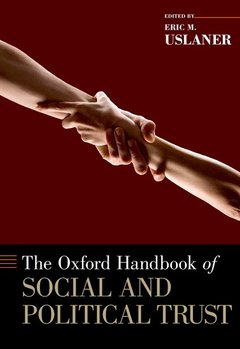Description
The Oxford Handbook of Social and Political Trust
Oxford Handbooks Series
Coordinator: Uslaner Eric M.
Language: English
Subjects for The Oxford Handbook of Social and Political Trust:
Publication date: 03-2018
752 p. · 18.4x25.5 cm · Hardback
752 p. · 18.4x25.5 cm · Hardback
Description
/li>Biography
/li>
This volume explores the foundations of trust, and whether social and political trust have common roots. Contributions by noted scholars examine how we measure trust, the cultural and social psychological roots of trust, the foundations of political trust, and how trust concerns the law, the economy, elections, international relations, corruption, and cooperation, among myriad societal factors. The rich assortment of essays on these themes addresses questions such as: How does national identity shape trust, and how does trust form in developing countries and in new democracies? Are minority groups less trusting than the dominant group in a society? Do immigrants adapt to the trust levels of their host countries? Does group interaction build trust? Does the welfare state promote trust and, in turn, does trust lead to greater well-being and to better health outcomes? The Oxford Handbook of Social and Political Trust considers these and other questions of critical importance for current scholarly investigations of trust.
Eric M. Uslaner is Professor of Government and Politics at the University of Maryland, College Park. He was a Senior Research Fellow at the Southwest University of Political Science and Law in Chongqing, China, and an Honorary Professor of Political Science at the University of Aarhus, in Denmark. He has also been a Fulbright Distinguished Professor at the Australian National University and a Fulbright Professor of American Studies at the Hebrew University, Jerusalem. He is the author of nine books, including The Moral Foundations of Trust; Corruption, Inequality, and the Rule of Law: The Bulging Pocket Makes the Easy Life; Segregation and Mistrust: Diversity, Isolation, and Social Cohesion; and The Historical Roots of Corruption: Mass Education, Economic Inequality, and State Capacity, as well as more than 150 articles.
© 2024 LAVOISIER S.A.S.
These books may interest you

Living in an Age of MistrustAn Interdisciplinary Study of Declining Trust and How to Get it Back 61.25 €

Living in an Age of MistrustAn Interdisciplinary Study of Declining Trust and How to Get it Back 160.25 €

Managing Public Trust 121.31 €

